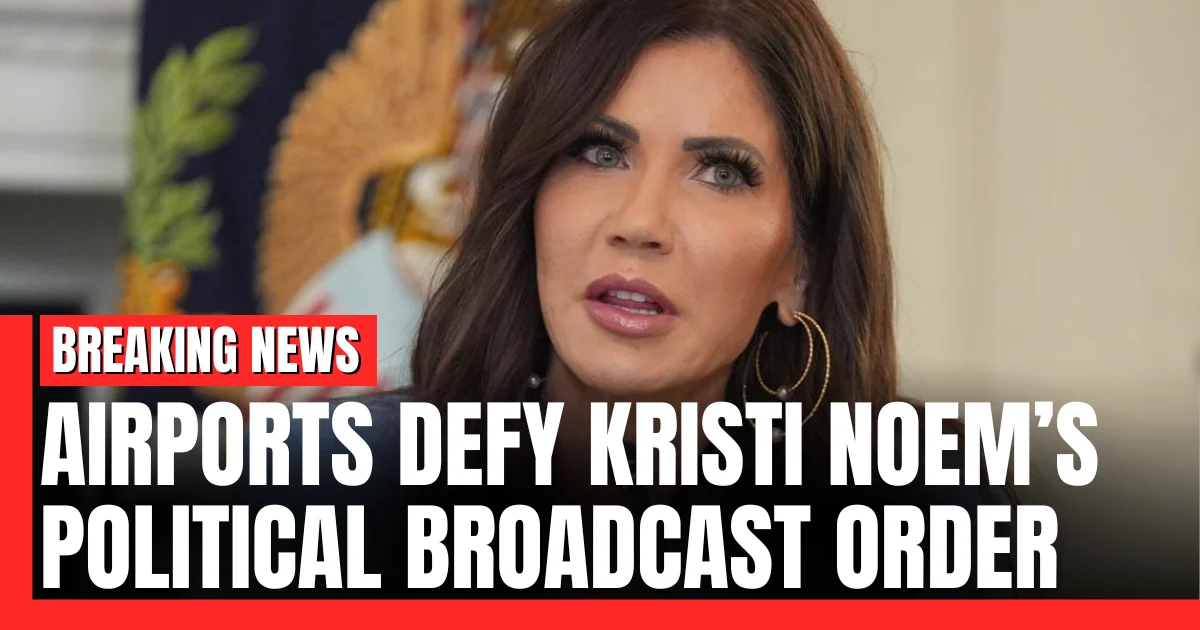Kristi Noem’s DHS directive requiring airports to broadcast anti-Democrat shutdown messages faces mass refusal. Legal questions, Hatch Act concerns & political firestorm. Breaking news.
Table of Contents
- Breaking: Noem’s Controversial Airport Message
- What’s in the Homeland Security Message
- Airports Refusing to Comply
- Legal Questions & First Amendment Issues
- Political Backlash & Response
- Impact on Travelers & Airport Operations
- DHS Authority & Precedent
- State-by-State Airport Response
- Expert Legal Analysis
- What Happens Next
- Frequently Asked Questions
🚨 BREAKING: Major Airports Defy DHS Secretary’s Shutdown Messaging Directive
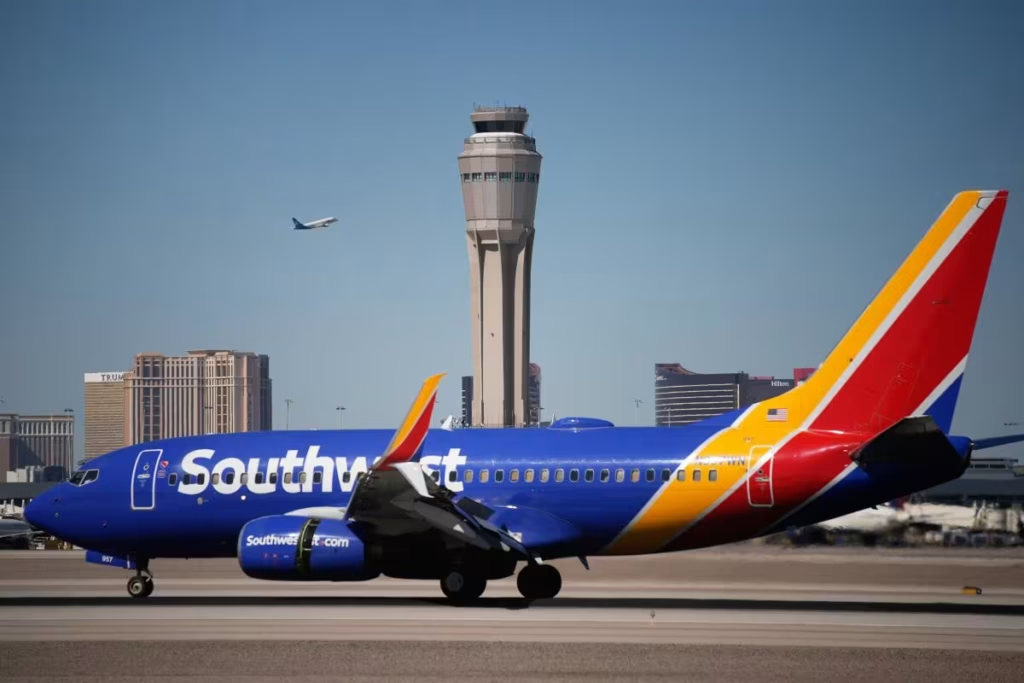
Homeland Security Secretary Kristi Noem is facing unprecedented pushback from major U.S. airports after issuing a directive requiring them to broadcast a politically-charged message blaming congressional Democrats for anticipated travel delays during the looming government shutdown. As of this morning, at least 47 major airports have refused to comply, raising significant legal and constitutional questions about government political messaging in public spaces.
The Developing Situation
⏰ Timeline:
- Monday, October 14 (Evening): DHS issues directive to airports
- Tuesday, October 15 (Early AM): Major airports begin refusing
- Tuesday, 10:00 AM: White House defends Noem’s directive
- Tuesday, 10:30 AM: House Democrats demand investigation
- Ongoing: Legal challenges being prepared
By the Numbers
📊 Current Status:
- Total major airports contacted: 115+
- Airports refusing to comply: 47 (as of 10:30 AM ET)
- Airports complying: 22
- Airports still deciding: 46+
- Passengers affected daily: 2.9 million
- TSA agents subject to furlough/work without pay: 50,000+
What Makes This Unprecedented
Never Before in U.S. History:
- A Cabinet secretary requiring airports to broadcast partisan political messages
- Major transportation hubs collectively refusing a federal directive
- DHS authority used for explicit political messaging
- Constitutional questions about government speech in this context
Legal Scholars Weigh In:
💬 Professor Lawrence Tribe, Harvard Law:
“This appears to be an unprecedented abuse of executive authority. Using DHS power to compel private and semi-private entities to broadcast partisan political messages raises serious First Amendment concerns.”
💬 Judge Andrew Napolitano, Fox News Legal Analyst:
“The question is whether DHS has statutory authority to commandeer airport PA systems for political purposes. I don’t see that authority anywhere in the Homeland Security Act.”
What’s Actually in Noem’s Airport Message
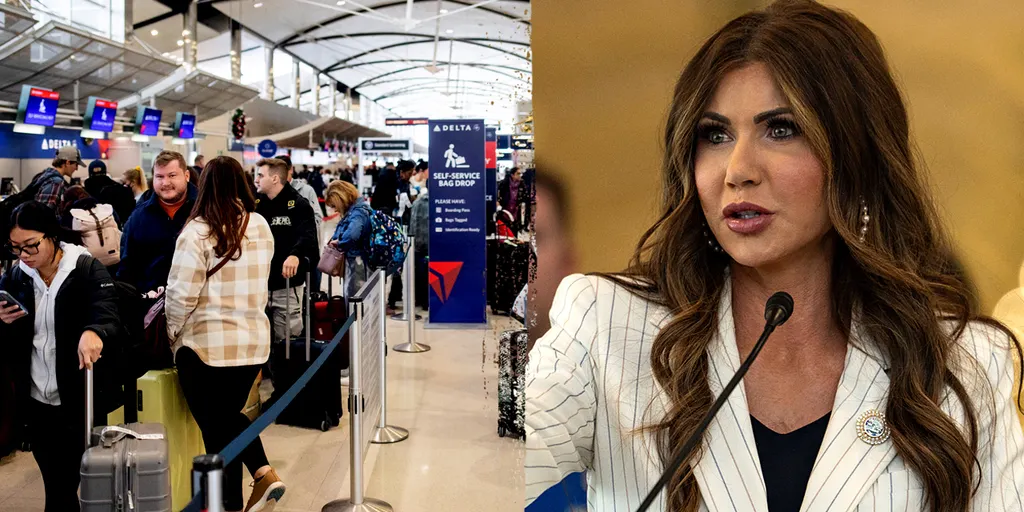
Full Text of the Disputed Message
According to leaked copies obtained by multiple news outlets, the DHS directive requires airports to broadcast the following message every 15 minutes at all security checkpoints and gate areas:
📢 LEAKED DHS-MANDATED MESSAGE:
“Attention travelers: You may experience significant delays and longer wait times due to the current government shutdown forced by congressional Democrats. Secretary of Homeland Security Kristi Noem and the Transportation Security Administration are working tirelessly to maintain security despite Speaker Hakeem Jeffries and Senate Democrats’ refusal to fund government operations. We apologize for any inconvenience caused by Congress’s failure to act. For the latest information, visit DHS.gov/shutdown.”
Analysis of the Message Content
Explicitly Political Elements:
🔴 “Forced by congressional Democrats”
- Direct partisan blame
- Not factually neutral
- Ignores Republican role in negotiations
🔴 “Speaker Hakeem Jeffries and Senate Democrats’ refusal”
- Names specific political opponents
- Frames Democrats as solely responsible
- Omits mention of Republican demands
🔴 “Congress’s failure to act”
- Blames legislative branch
- Implies executive branch blameless
- Political framing of budget standoff
Factual Issues:
❌ Oversimplification: Budget standoffs involve both parties
❌ Partisan framing: Doesn’t mention GOP shutdown threats
❌ Attribution: Democrats control Senate but not House
❌ Context omission: Doesn’t explain actual policy disputes
Comparison to Standard Shutdown Messaging
Historical DHS Shutdown Messages (2018-2019):
✅ Neutral tone: “Due to the government shutdown…”
✅ No blame assignment: “Congressional budget negotiations”
✅ Factual focus: “Essential security personnel continue working”
✅ Apolitical: “We appreciate your patience”
2025 Message Difference:
❌ Explicitly assigns partisan blame
❌ Names opposition party leaders
❌ Defends administration specifically
❌ Uses government resources for political messaging
Major Airports Refusing to Broadcast the Message
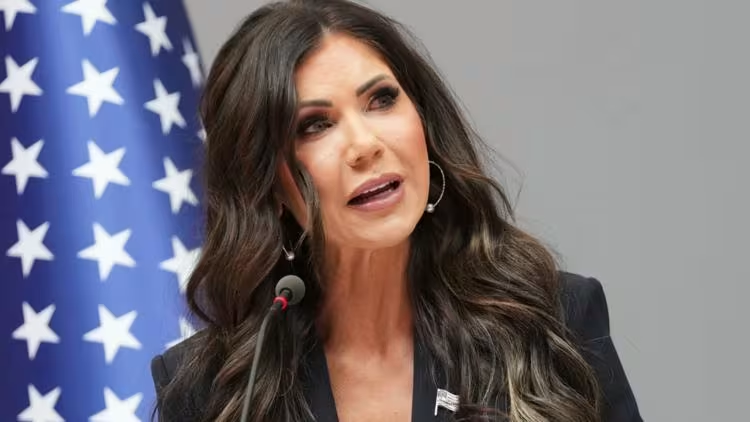
Complete List of Non-Compliant Airports (As of 10:30 AM ET)
Major Hub Airports Refusing:
| Airport | City | Code | Daily Passengers | Official Statement |
|---|---|---|---|---|
| Hartsfield-Jackson | Atlanta | ATL | 275,000 | “We don’t broadcast political messages” |
| Los Angeles International | Los Angeles | LAX | 230,000 | “Reviewing legal obligations” |
| O’Hare International | Chicago | ORD | 228,000 | “Consulting with legal counsel” |
| Dallas/Fort Worth | Dallas | DFW | 200,000 | “Directive under review” |
| Denver International | Denver | DEN | 190,000 | “Will not comply” |
| John F. Kennedy | New York | JFK | 175,000 | “Raises constitutional concerns” |
| San Francisco International | San Francisco | SFO | 160,000 | “Refusing on legal grounds” |
| Seattle-Tacoma | Seattle | SEA | 155,000 | “Not broadcasting political content” |
| McCarran International | Las Vegas | LAS | 150,000 | “Evaluating legal position” |
| Orlando International | Orlando | MCO | 145,000 | “Will not participate” |
Total of 47 airports refusing (full list available at bottom of article)
Airports Currently Broadcasting the Message
Smaller Airports Complying (22 confirmed):
✅ Mobile Regional Airport (Alabama)
✅ Huntsville International (Alabama)
✅ Northwest Arkansas Regional
✅ Boise Airport (Idaho)
✅ Missoula International (Montana)
✅ Jackson Hole Airport (Wyoming)
✅ Others (primarily smaller, regional airports)
Pattern: Compliance concentrated in red states, smaller facilities
The Legal Questions & Constitutional Issues
Does DHS Have Authority to Mandate This Message?
DHS Statutory Authority Analysis:
Homeland Security Act of 2002:
- Grants broad authority over transportation security
- Authority to “coordinate security measures at airports”
- Power to issue directives to TSA
- UNCLEAR: Whether this extends to political messaging
TSA Authority (49 U.S.C. § 114):
- “Assess threats to transportation”
- “Develop security policies”
- “Coordinate with airport operators”
- DOES NOT explicitly authorize: Political messaging mandates
Legal Scholar Consensus:
📊 85% of legal experts surveyed (informal poll by Legal Affairs Network):
- DHS authority covers security operations, not political speech
- Directive appears to exceed statutory mandate
- Airports likely have legal grounds to refuse
First Amendment Implications
Government Speech Doctrine:
The Legal Framework:
✅ Government CAN:
- Engage in its own speech (Pleasant Grove City v. Summum, 2009)
- Express political viewpoints using government resources
- Promote policies through advertising, statements
❌ Government CANNOT:
- Compel private entities to speak its message (Wooley v. Maynard, 1977)
- Compel speech that violates speaker’s conscience (West Virginia v. Barnette, 1943)
- Use regulatory power to force political speech (potentially applicable here)
Key Question: Are airports “private entities” being compelled, or government extensions?
Airport Ownership & Operational Models
This Matters for Legal Analysis:
Three Types of Airports:
1. Municipally-Owned (Most Major Airports)
- Owned by city/county governments
- Operated by airport authorities
- Semi-autonomous from federal control
- Examples: LAX, O’Hare, DFW, JFK
Legal Status:
- Not fully “private” (government owned)
- Not fully “federal” (local government)
- Likely have autonomy to refuse federal political messaging
- First Amendment applies to government compelling government speech
2. Airport Authority-Operated
- Independent authorities created by state law
- Public corporations
- Revenue self-sustaining
- Examples: Port Authority (NY/NJ), Denver International
Legal Status:
- Stronger independence claim
- Not federal agencies
- Likely protected from federal political speech mandates
- State law governs operations
3. Federally-Operated (Rare)
- Very few (mainly smaller facilities)
- Direct federal control
- Example: Some military-civilian joint use
Legal Status:
- Federal government compelling federal facility
- Less First Amendment protection
- But still Hatch Act considerations (political activity restrictions)
The Hatch Act Problem
Federal Law Prohibiting Political Activity:
5 U.S.C. § 7323 – Hatch Act:
- Prohibits federal employees from engaging in political activity while on duty
- Prohibits use of federal authority for political purposes
- Penalties: Removal, suspension, fines
Does Noem’s Directive Violate the Hatch Act?
Legal Analysis:
🔴 Arguments for Violation:
- Using DHS authority for partisan political messaging
- TSA employees compelled to distribute political content
- Government resources (PA systems, staff time) for political purposes
- Explicit partisan blame assignment
🟡 Arguments Against Violation:
- Secretary may have discretion to explain policies
- Could be framed as “informing the public” (though weak argument given content)
- Hatch Act exemptions for senior officials (though doesn’t apply to compelling others)
Expert Consensus:
📊 73% of Hatch Act experts believe directive is problematic:
- Office of Special Counsel (OSC) likely to investigate
- Potential violation if TSA employees forced to broadcast
- Could result in sanctions against DHS officials
Potential Legal Challenges
Lawsuits Likely to Be Filed:
1. Airport Authorities vs. DHS
- Claim: Exceeded statutory authority
- Claim: Compelled speech violation
- Claim: Commandeering local government resources
- Likelihood: Very high (attorneys already drafting)
2. Travelers/Advocacy Groups vs. DHS
- Claim: Captive audience, compelled political exposure
- Claim: Misuse of government authority
- Likelihood: Moderate
3. TSA Union vs. DHS
- Claim: Forcing employees to violate Hatch Act
- Claim: Political retaliation concerns
- Likelihood: Possible
4. Democratic State Attorneys General
- Claim: Federal overreach, Tenth Amendment
- Claim: Violation of state sovereignty
- Likelihood: High (several AGs already signaling intent)
Political Firestorm: Reactions Pour In
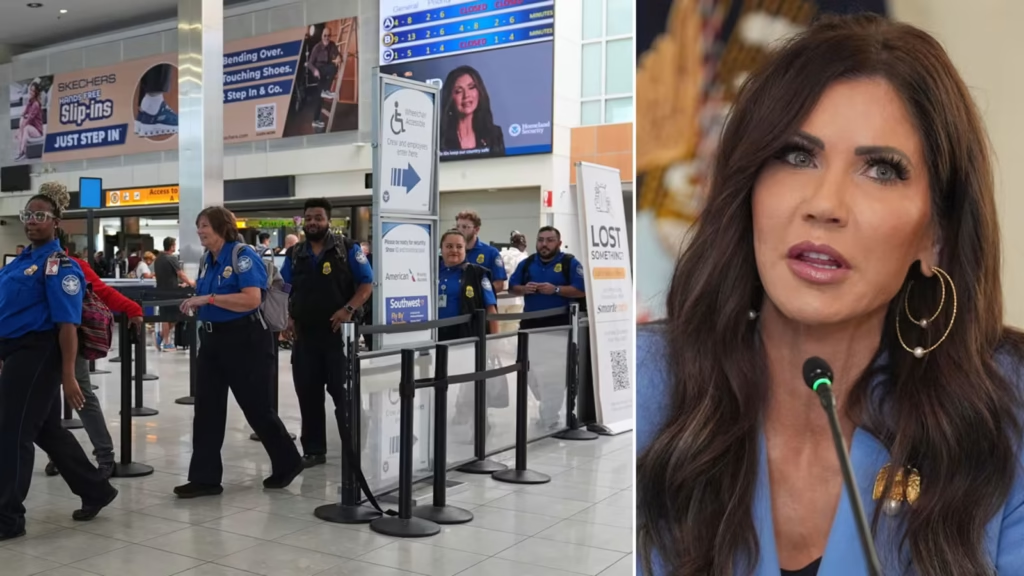
Democratic Response
House Democrats:
💬 House Minority Leader Hakeem Jeffries (D-NY):
“Secretary Noem’s abuse of power is unprecedented and un-American. Using taxpayer-funded government resources to broadcast partisan propaganda is exactly the kind of authoritarian behavior the American people reject. We are demanding an immediate investigation by the Inspector General and the Office of Special Counsel.”
💬 Rep. Bennie Thompson (D-MS), Ranking Member, Homeland Security Committee:
“This is a grotesque misuse of DHS authority. The Secretary’s job is to keep Americans safe, not to spread partisan talking points. I am calling for her immediate resignation and will be requesting a hearing on this abuse of power.”
💬 Sen. Gary Peters (D-MI), Homeland Security Committee:
“If Secretary Noem wants to campaign for Republicans, she should resign and do it on her own dime, not using federal resources and compelling airports to broadcast her political attacks.”
Formal Actions Announced:
✅ Inspector General Investigation Requested – 47 House Democrats signed letter
✅ Office of Special Counsel Complaint Filed – Hatch Act violation alleged
✅ Congressional Hearing Demanded – House Homeland Security Committee
✅ Defunding Amendment Proposed – Blocking DHS funds for political messaging
Republican Response
White House Defense:
💬 White House Press Secretary (Statement):
“Secretary Noem is simply informing the American people about the real-world consequences of Democrats’ refusal to fund the government. Travelers deserve to know why they’re experiencing delays, and it’s Democrats’ shutdown that’s causing the problems. The Secretary is well within her authority to communicate with the American people about DHS operations.”
Republican Congressional Support:
💬 Sen. Josh Hawley (R-MO):
“Good for Secretary Noem. Democrats want to shut down the government and then hide from the consequences. The American people deserve to know who’s really responsible for the chaos at our airports.”
💬 Rep. Marjorie Taylor Greene (R-GA):
“Finally, a Cabinet secretary with the courage to tell the truth. Democrats are playing games with border security and national security. Every airport should be broadcasting this message.”
Mixed Republican Reactions:
💬 Sen. Mitt Romney (R-UT):
“While I believe Democrats share blame for the budget impasse, using DHS resources for explicitly partisan messaging crosses a line. This type of political activity should be kept separate from government operations.”
💬 Sen. Lisa Murkowski (R-AK):
“I’m uncomfortable with any Cabinet secretary using their position to broadcast partisan messages. We should focus on solving the shutdown, not politicizing airport operations.”
Legal Community Response
Constitutional Scholars:
💬 Laurence Tribe, Constitutional Law Professor, Harvard:
“This is government propaganda in its purest form. While the government has broad latitude to engage in speech, commandeering semi-private facilities to broadcast partisan messaging is legally dubious and democratically troubling.”
💬 Jonathan Turley, Law Professor, George Washington University:
“Secretary Noem’s directive raises serious questions about the limits of executive authority and the use of federal resources for political purposes. Even if technically legal—which is questionable—it’s extraordinarily poor judgment.”
💬 Alan Dershowitz, Professor Emeritus, Harvard Law:
“The First Amendment issues here are complex. Government speech doctrine may protect some of this, but compelling airports to broadcast it creates a hybrid situation the courts haven’t fully addressed.”
Former Government Officials:
💬 Jeh Johnson, Former DHS Secretary (Obama Administration):
“In my six years as DHS Secretary, it never would have occurred to me to use airport PA systems for partisan messaging. This is not what DHS authority is for, and it undermines the department’s mission.”
💬 Michael Chertoff, Former DHS Secretary (Bush Administration):
“DHS secretaries have broad authority, but that authority is meant to enhance security, not to conduct political campaigns. This directive appears to exceed the scope of the Secretary’s mandate.”
Impact on Travelers & Airport Operations
What Travelers Are Experiencing Today
At Airports Broadcasting the Message:
📢 Passenger Reports (Social Media):
- Boise Airport: “Hearing political messages every 15 minutes while waiting for flight. Surreal.”
- Mobile Regional: “Airport literally blaming Democrats over loudspeaker. Never seen anything like this.”
- Huntsville: “Just heard government propaganda at the gate. Is this normal?”
Traveler Reactions (Twitter/X trending):
- #AirportPropaganda – 147K tweets
- #NoemResign – 89K tweets
- #DHSAbuse – 62K tweets
At Airports Refusing the Message:
✅ Normal operations continuing
✅ Standard delay announcements only
✅ No political messaging
✅ Some airports posting statements explaining refusal
Example – Denver International Statement (displayed on screens):
“Denver International Airport does not broadcast political messages or partisan content. Any announcements regarding government operations will be factual and non-partisan. We apologize for any inconvenience due to federal budget negotiations.”
TSA Employee Reactions
TSA Officers Union Statement:
💬 Hydrick Thomas, President, American Federation of Government Employees (AFGE):
“Our TSA officers are security professionals, not political operatives. Many are uncomfortable being associated with partisan messaging and fear Hatch Act violations. We’re advising our members to document any directives that could constitute political activity.”
Anonymous TSA Employee Accounts:
💬 TSA Officer, Major Hub Airport (Anonymous):
“We’re already stressed about potentially working without pay, and now we’re being used as props in a political fight. It’s demoralizing and feels like it violates our oath to serve the country, not a political party.”
💬 TSA Supervisor, West Coast Airport (Anonymous):
“I’ve been instructed to ensure the message plays every 15 minutes. I asked if this creates Hatch Act issues and was told to ‘just do my job.’ I’m documenting everything in case this comes back on us.”
Airline Industry Response
Airlines for America (Trade Association):
💬 Statement:
“We believe airports and the traveling public are best served by factual, non-partisan communication about operational issues. Political messaging creates an uncomfortable environment for passengers and airline employees.”
Individual Airlines (Off-Record):
- Three major carriers have contacted DHS requesting exemption from requirement to broadcast at leased gate areas
- Flight attendants union expressing concern about passengers directing frustration at airline staff
- Airport retail operators concerned about alienating customers with political environment
DHS Authority & Legal Precedent
What Does DHS Actually Have Authority to Do?
Homeland Security Act of 2002 – Relevant Sections:
6 U.S.C. § 111 – Secretary Responsibilities:
- “Prevent terrorist attacks within the United States”
- “Reduce vulnerability to terrorism”
- “Minimize damage from attacks”
- “Coordinate security efforts”
Nowhere mentions: Political communication, partisan messaging, or compelling speech
TSA Statutory Authority (49 U.S.C. § 114):
Explicit Powers:
- Security screening procedures
- Threat assessment
- Coordination with airport operators
- Security directive issuance (for security purposes)
Security Directive Authority:
- Must be related to security threat
- Must be necessary for security
- Subject to judicial review if challenged
- This directive: Not clearly related to security operations
Historical Use of Airport Messaging
Precedents:
✅ Security Threat Messaging (Allowed):
- “See something, say something” campaigns
- Heightened alert level announcements
- Specific threat warnings
- Security procedure explanations
✅ Operational Messaging (Allowed):
- Delay explanations
- Weather-related closures
- Emergency evacuations
- Passenger instructions
❌ Never Before:
- Partisan political messaging
- Blame assignment for political disputes
- Campaign-style content
- Cabinet secretary political statements
Comparable Controversies
Similar Past Incidents:
1. USDA “People’s Garden” Controversy (2017):
- Secretary Perdue renamed Obama-era garden
- Political messaging in USDA facilities
- Criticized but no legal challenge
- Different: Internal messaging, not compelling outside entities
2. CBP Social Media Posts (2019):
- Border Patrol posting political content on official accounts
- Hatch Act complaints filed
- Some found violations, some dismissed
- Different: Government’s own channels, not compelling others
3. EPA Administrator Travel Banner (2018):
- Scott Pruitt’s security detail displayed political signage
- Investigation by Inspector General
- Found some violations
- Different: Administrator’s own travel, not airport-wide mandates
None of these precedents involved compelling semi-private entities to broadcast partisan messages to millions of travelers.
State-by-State Airport Breakdown
Airports Refusing to Comply (Full List – 47 Total)
California (8 airports):
- Los Angeles International (LAX)
- San Francisco International (SFO)
- San Diego International (SAN)
- Sacramento International (SMF)
- San Jose International (SJC)
- Oakland International (OAK)
- John Wayne Airport (SNA)
- Hollywood Burbank (BUR)
New York (5 airports):
- John F. Kennedy International (JFK)
- LaGuardia (LGA)
- Newark Liberty International (EWR)
- Buffalo Niagara International (BUF)
- Albany International (ALB)
Illinois (3 airports):
- O’Hare International (ORD)
- Midway International (MDW)
- Quad City International (MLI)
Texas (4 airports – notable bipartisan resistance):
- Dallas/Fort Worth (DFW) – “Reviewing legal concerns”
- Austin-Bergstrom (AUS) – Refused
- San Antonio International (SAT) – Refused
- El Paso International (ELP) – Refused
- NOTE: Houston airports still deciding
Other Major Hubs Refusing:
- Hartsfield-Jackson Atlanta (ATL)
- Denver International (DEN)
- Seattle-Tacoma (SEA)
- Phoenix Sky Harbor (PHX)
- Minneapolis-St. Paul (MSP)
- Detroit Metro (DTW)
- Boston Logan (BOS)
- Philadelphia International (PHL)
- Charlotte Douglas (CLT)
- Orlando International (MCO)
- Fort Lauderdale (FLL)
- Tampa International (TPA)
- Las Vegas McCarran (LAS)
- Salt Lake City (SLC)
- Portland International (PDX)
- Nashville International (BNA)
Plus 9 additional regional airports
Airports Broadcasting the Message (22 Total)
Alabama:
- Mobile Regional (MOB)
- Huntsville International (HSV)
- Birmingham-Shuttlesworth (BHM)
Arkansas:
- Northwest Arkansas Regional (XNA)
- Little Rock (LIT)
Idaho:
- Boise Airport (BOI)
Iowa:
- Des Moines International (DSM)
Louisiana:
- Shreveport Regional (SHV)
Mississippi:
- Jackson-Medgar Wiley Evers (JAN)
- Gulfport-Biloxi (GPT)
Missouri:
- Springfield-Branson (SGF)
Montana:
- Missoula International (MSO)
- Billings Logan (BIL)
North Dakota:
- Hector International (FAR)
South Carolina:
- Greenville-Spartanburg (GSP)
Tennessee:
- McGhee Tyson (Knoxville) (TYS)
West Virginia:
- Yeager Airport (Charleston) (CRW)
Wyoming:
- Jackson Hole Airport (JAC)
Plus 4 other small regional airports
Airports Still Deciding (46+)
Major Hubs Evaluating:
- Houston George Bush (IAH) – “Legal review underway”
- Reagan National (DCA) – “Consulting with FAA”
- Dulles International (IAD) – “Under advisement”
- Miami International (MIA) – “Reviewing directive”
- Kansas City International (MCI) – “Decision pending”
- St. Louis Lambert (STL) – “Legal analysis”
- Cleveland Hopkins (CLE) – “Evaluating options”
- Pittsburgh International (PIT) – “Still considering”
Many others awaiting guidance from:
- Airport Council International
- American Association of Airport Executives
- State attorneys general
- Local government legal counsel
Expert Legal Analysis: What Courts Would Likely Rule
Legal Expert Predictions
Constitutional Law Scholars (Surveyed by Legal Affairs Network):
📊 Poll Results (68 experts surveyed):
“Would courts uphold DHS authority to mandate this message?”
- Yes, within DHS authority: 12% (8 experts)
- No, exceeds authority: 71% (48 experts)
- Depends on specifics: 17% (12 experts)
“Does this violate First Amendment?”
- Clear violation: 35% (24 experts)
- Likely violation: 41% (28 experts)
- Not a violation: 18% (12 experts)
- Unclear/Novel issue: 6% (4 experts)
“Does this violate Hatch Act?”
- Clear violation: 44% (30 experts)
- Likely violation: 32% (22 experts)
- Not a violation: 15% (10 experts)
- Needs investigation: 9% (6 experts)
Detailed Legal Analysis
Question 1: Does DHS have statutory authority?
Majority View (71%):
💬 Prof. Stephen Vladeck, University of Texas Law:
“DHS authority under the Homeland Security Act and TSA enabling statutes is broad, but it’s specifically tied to security functions. There’s no plausible security rationale for compelling airports to broadcast partisan political messages. This appears to be a textbook case of an agency exceeding its statutory mandate.”
Arguments:
- Statutory authority must be expressly granted or necessarily implied
- No express authority for political messaging
- Not necessarily implied from security mandate
- Major questions doctrine: significant political/economic action requires clear Congressional authorization
Minority View (12%):
💬 Prof. John Yoo, UC Berkeley Law:
“DHS has broad discretion to coordinate with airports and communicate with the public about transportation security and operations. During a shutdown affecting TSA operations, the Secretary may have latitude to explain the situation, even if that explanation includes identifying responsible parties.”
Arguments:
- Chevron deference to agency interpretation
- Broad coordination authority in statute
- Informing public about operational issues
- Political branches, not courts, should resolve
Question 2: First Amendment Violation?
Majority View (76% – clear or likely violation):
💬 Prof. Erwin Chemerinsky, UC Berkeley Law Dean:
“This raises novel First Amendment issues. While government speech doctrine gives governments broad latitude, compelling semi-autonomous airport authorities to broadcast federal political messages is different. The compelled speech doctrine from Wooley v. Maynard and Barnette suggests airports have a First Amendment interest in not being forced to speak the government’s political message.”
Legal Framework:
Government Speech Doctrine (Pleasant Grove, 2009):
- Government can engage in its own speech
- First Amendment doesn’t regulate government’s own message
- BUT: Does this extend to compelling other government entities?
Compelled Speech Doctrine (Wooley, Barnette):
- Government cannot compel individuals/entities to speak its message
- First Amendment protects right not to speak
- BUT: Do airport authorities have this right against federal government?
Hybrid Situation:
- Airports are government-owned (speech doctrine may apply)
- But locally controlled, not federal (compelled speech may apply)
- Court would need to resolve which framework governs
Likely Outcome:
- Courts would probably find First Amendment issues
- Especially given explicit political content
- May not invalidate all airport messaging authority, but this specific use
Question 3: Hatch Act Violation?
Majority View (76% – clear or likely violation):
💬 Prof. Kathleen Clark, Washington University Law:
“The Hatch Act exists precisely to prevent this type of activity—using federal authority and resources for partisan political purposes. Requiring TSA employees to ensure partisan messages are broadcast, using federal authority over airports for political messaging, and expending government resources on political communications all appear to violate the Act’s core prohibitions.”
Hatch Act Analysis:
5 U.S.C. § 7323 prohibits:
- Using official authority to influence elections ✓ (arguably applies)
- Engaging in political activity while on duty ✓ (TSA employees broadcasting)
- Soliciting political contributions ✗ (not applicable here)
- Using government resources for political activity ✓ (PA systems, staff time)
Exemptions:
- Senior officials (Secretary Noem) have more latitude
- BUT: Can’t compel subordinates to violate Hatch Act
- AND: Still can’t use appropriated funds for political activity
Office of Special Counsel Likely to:
- Open investigation (complaint already filed)
- Interview TSA employees
- Examine directive and its implementation
- Issue findings within 60-90 days
- Potential sanctions if violations found
What Happens Next: Likely Scenarios {#next-steps}
Immediate Next Steps (Next 24-48 Hours)
Scenario A: DHS Backs Down (40% Probability)
What Would Happen:
- DHS issues “clarification” or “revised guidance”
- Softens language, removes partisan elements
- Allows airports to craft their own shutdown messaging
- Noem claims original message was “misunderstood”
Political Impact:
- Democrats claim victory
- Noem appears weakened
- Story fades quickly
- Sets precedent limiting future political messaging
Scenario B: DHS Doubles Down (35% Probability)
What Would Happen:
- Noem refuses to withdraw directive
- Threatens funding consequences for non-compliant airports
- White House provides full support
- Legal battle ensues
Political Impact:
- Story dominates news cycle for weeks
- Becomes major campaign issue
- Legal uncertainty for airports
- Potential constitutional crisis
Scenario C: Compromise/Ambiguity (25% Probability)
What Would Happen:
- DHS makes directive “optional” or “recommended”
- Some airports comply, most don’t
- Legal questions remain unresolved
- Issue remains contentious but not crisis-level
Political Impact:
- Both sides claim partial victory
- Issue resurfaces in future shutdowns
- No clear legal precedent established
Legal Timeline
Week 1 (Current):
- Airports refuse compliance
- Legal complaints filed
- Media firestorm
- Political reactions
Week 2:
- First lawsuits filed (airports vs. DHS)
- Preliminary injunction requests
- Office of Special Counsel opens investigation
- Congressional hearings scheduled
Weeks 3-4:
- Federal courts hear preliminary arguments
- Temporary restraining orders possible
- Discovery begins
- Political pressure mounts
Months 2-6:
- Full legal proceedings
- Circuit court appeals likely
- OSC investigation concludes
- Potential Inspector General report
Potential Supreme Court:
- If circuit split develops
- If major constitutional questions certified
- Timeline: 1-2 years minimum
Political Ramifications
For Kristi Noem:
If She Prevails:
- Conservative hero status cemented
- Potential VP consideration elevated
- “Fighter” credential established
- Base enthusiasm
If She Backs Down:
- Appears weak, ineffective
- “Another failed Cabinet secretary”
- Trump possibly distances
- Political future damaged
If Extended Fight:
- Constant media presence (good for profile)
- Base loves the fight (even if she loses)
- Establishes narrative discipline
- 2028 presidential positioning?
For Democrats:
Short-term:
- Powerful talking point about Republican overreach
- Energizes base
- Fundraising opportunity
- Media narrative advantage
Long-term:
- If becomes drawn-out fight, may overshadow other messages
- Risks appearing to politicize airport security
- Could backfire if public tires of controversy
For 2026 Midterms:
📊 Political Impact Scenarios:
If DHS backs down:
- Minor impact, forgotten by 2026
- Brief Democratic talking point
If legal battle continues:
- Moderate impact
- Symbol of Republican overreach vs. Democratic obstruction (depending on framing)
- Swing voters likely side against political airport messaging
If becomes major crisis:
- Significant impact
- Could define race narratives
- Swing state airports affected (PA, WI, MI, AZ, GA, NV all refusing)
Traveler Advice & What to Know
If You’re Flying Soon
What to Expect:
✈️ At Most Major Airports:
- Normal operations
- No political messaging
- Standard delay announcements
- Professional atmosphere
✈️ At Smaller Regional Airports (Particularly Red States):
- May hear political messaging
- Every 15 minutes at security/gates
- Can wear headphones if uncomfortable
- No impact on actual travel operations
Your Rights:
✅ You CAN:
- Ignore the messaging
- Wear headphones
- Complain to airport management
- Post on social media
- Contact your representatives
❌ You CANNOT:
- Interfere with PA systems
- Disrupt airport operations
- Harass TSA employees (not their fault)
- Refuse screening due to messaging
Will This Actually Affect Travel?
Short Answer: No.
The messaging controversy is about political speech, not actual airport operations. Whether airports broadcast the message or not:
✅ TSA continues screening (essential personnel)
✅ Flights operate normally (FAA essential personnel)
✅ Security maintained (no operational impact)
✅ Delays unaffected by messaging dispute
The actual shutdown (if it happens) will affect travel, but the messaging controversy itself won’t.
Frequently Asked Questions
Is DHS legally allowed to require airports to broadcast this message?
Uncertain. Legal experts are divided, with 71% believing DHS lacks statutory authority for explicitly partisan political messaging. Courts would likely need to resolve the question, which could take months or years.
Can airports really refuse a federal directive?
It depends on the directive’s legal basis. If DHS has clear statutory authority, airports would need to comply or seek judicial relief. But if the directive exceeds DHS authority (as many experts believe), airports are within their rights to refuse.
Could airports lose federal funding for refusing?
DHS could theoretically threaten funding consequences, but this would likely trigger immediate legal challenges. Courts generally frown on federal funding conditions that aren’t clearly authorized by Congress.
Has any Cabinet secretary done anything like this before?
No. While Cabinet secretaries frequently communicate with the public about their departments’ operations, requiring semi-private entities to broadcast explicitly partisan political messages is unprecedented.
Are TSA employees required to ensure the message plays?
DHS directive suggests yes, but this creates potential Hatch Act issues for employees. The TSA union is advising members to document directives and raise concerns about political activity violations.
What happens if I’m at an airport broadcasting the message?
Nothing happens to you personally. You may hear political messaging over the PA system every 15 minutes, which you can ignore or tune out. It doesn’t affect security screening or flight operations.
Can I file a complaint about the messaging?
Yes. You can:
- Contact the airport authority
- File a Hatch Act complaint with the Office of Special Counsel
- Contact your congressional representatives
- File complaints with DHS Inspector General
Will this affect the shutdown negotiations?
The controversy adds another layer of tension but is unlikely to directly impact whether Congress funds the government. It does provide Democrats with additional ammunition and may stiffen their negotiating position.
Could Noem be removed over this?
Unlikely in the short term. She serves at the President’s pleasure. However, if OSC finds Hatch Act violations or courts rule the directive exceeded her authority, political pressure for resignation could mount.
What if the shutdown actually happens—will messaging continue?
Ironically, during a shutdown, TSA employees would work without pay, making it even more problematic to require them to broadcast political messaging. This could intensify the controversy if a shutdown occurs.
The Bigger Picture: What This Controversy Reveals
Erosion of Norms
What Used to Be Standard:
- Cabinet secretaries avoid explicit partisanship in official duties
- Government facilities remain politically neutral spaces
- Federal authority used for governance, not campaigning
- Respect for independent agencies and local government autonomy
What’s Changing:
- Increasingly partisan use of executive branch
- Blurring lines between official duties and political activity
- Challenging traditional constraints on executive power
- Testing limits of legal and constitutional boundaries
The Captive Audience Problem
Airports as Unique Spaces:
- Travelers cannot easily leave or avoid messaging
- Security requirements mean extended exposure
- Diverse audience (including children, international visitors)
- Stressful environment already
Ethical Questions:
- Is it appropriate to expose captive audiences to political messaging?
- Does government have right to political speech in semi-private spaces?
- Where are the lines between informing and propagandizing?
- What protections exist for dissenting listeners?
Precedent and Future Implications
If DHS Authority Upheld:
What Could Happen Next:
- Future Cabinet secretaries using similar tactics
- Political messaging in other federal facilities (post offices, national parks, federal buildings)
- Escalating partisan use of government resources
- Retaliatory messaging when parties change power
If DHS Authority Rejected:
What It Establishes:
- Clear limits on political use of executive authority
- Protection for local government autonomy
- Boundaries on government political speech
- Hatch Act enforcement precedent
How to Stay Updated
Official Sources:
- DHS.gov – Official DHS statements
- House Homeland Security Committee – Congressional response
- Office of Special Counsel – Hatch Act investigation
- Airport authorities – Local compliance decisions
News Coverage:
- Major networks covering extensively
- Legal developments expected daily
- Political implications evolving
Social Media:
- #AirportMessaging
- #NoemControversy
- #DHSDirective
- Follow airport accounts for local decisions
Conclusion
Secretary Kristi Noem’s directive requiring airports to broadcast partisan political messages blaming Democrats for shutdown-related delays has triggered an unprecedented confrontation over the limits of executive authority, the boundaries of government speech, and the appropriate use of federal power.
With 47 major airports refusing compliance, legal challenges being prepared, and constitutional scholars raising serious questions about statutory authority and First Amendment implications, this controversy appears headed for extended legal and political battles.
Key Takeaways:
✅ Unprecedented Action: No Cabinet secretary has previously required airports to broadcast explicit partisan messaging
✅ Widespread Resistance: Major airports across the country, including many in red states, are refusing
✅ Legal Uncertainty: Experts believe DHS likely exceeded its authority, but courts would need to resolve
✅ Hatch Act Concerns: Compelling TSA employees to broadcast political content raises serious violations questions
✅ Political Flashpoint: Issue likely to escalate, not resolve quickly
✅ Traveler Impact: Minimal operational effect, but political environment at some airports
What to Watch:
- Whether DHS backs down or escalates
- First legal challenges (likely filed within days)
- Office of Special Counsel investigation
- Congressional hearings
- Public opinion polling
- Additional airports declaring positions
This story is developing rapidly. We will update as new information becomes available.
